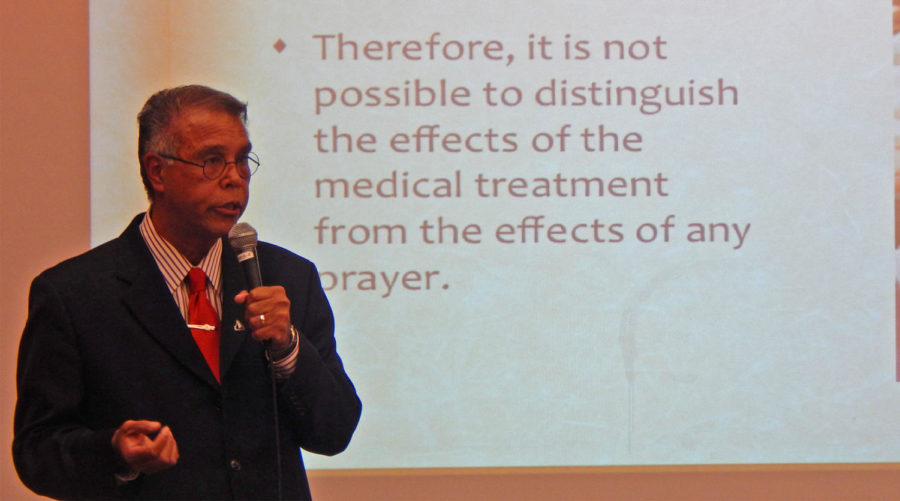Professor discusses possibility of proving prayers are beneficial
April 6, 2015
Hector Avalos, professor of philosophy and religious studies, spoke with the Atheist and Agnostic Society on Monday to discuss the possibility of scientifically proving the benefits of prayer.
“I don’t want people being hurt by beliefs that won’t work,” Avalos said, asserting his belief that science cannot prove the benefits of prayer.
Throughout the lecture, Avalos guided his audience through the many problems science would face if it ever did attempt to prove prayer’s scientific benefits. Many of these problems revolved around the plethora of unpredictable variables.
“Someone might pray for the health of all people, so it’s impossible to scientifically study prayer,” Avalos said. “Most people receive medical help and prayer, so there’s no way of seeing the separate benefits of medicine and prayer.”
On top of this, Avalos discussed scientific studies that already attempted to scientifically prove the benefits of prayer.
“In some studies, you’re actually worse off receiving prayer in this case,” Avalos said, speaking on studies where the prayer control group yielded worse results than the control group without prayer.
Another issue Avalos said was present involves the inability to point to God as responsible for anything if his existence cannot be proven.
“You need to know that a being is to know that it did something,” Avalos said. “That’s like saying I don’t know if martians exist, but they set my pants on fire.”
While the lecture title asked if prayer could be scientifically proven, the main point of the lecture was not only to dispel the idea that prayer could be proven scientifically, but also to persuade people to not turn to prayer for medical help in the first place, Avalos said.
“Instead of building a church, you could build a hospital,” Avalos said. “If the Christian God exists then disease would not exist.”
Part of this lecture’s existence comes from Avalos’ history, where he was once an evangelical Christian. Avalos said as a child he believed in the healing power of prayer, but throughout the years, as he gained knowledge about the world, he left behind many of those beliefs.
“I used to think that I was talking with God, but now I know that I was just talking to myself, trying to work things out,” Avalos said.
The lecture also opened up to questioning, which allowed people to question and challenge Avalos’ viewpoint. While many agreed with Avalos, as most in attendance were members of the Atheist and Agnostic Society, some challenged Avalos’ ideas, which group leaders said were welcomed.
“It always opens up discussion and honest dialogue for topics that are usually off the table,” said Christjahn Beck, president of the Atheist and Agnostic Society.







